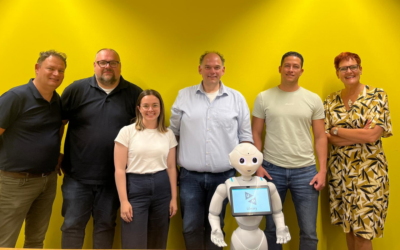During the first months, Pepper the service robot, was tested by students in a closed room. For the second phase of this project, Pepper will be installed in the public area of the Inner City Library as of 15 January. It will stay there for research for six weeks. After this pilot, Pepper will return to the supplier. PhD Candidates will use the outcomes of the project for their research into enhancing information services by implementing a robot.
Use of Pepper
Pepper is a physical robot that can interact with users. Students can engage with Pepper by pressing the ‘ask me a question’ on the screen, and from there they can ask Pepper basic questions about the library and library services. These questions can range from asking, “Where is the bathroom?” even to “How do I connect to the Wi-Fi?”
Legal and privacy statement
- It should be noted that Pepper uses Generative AI (GenAI), a type of Artificial Intelligence that can create a wide variety of data, such as images, videos, audio, text, and 3D models. It does so by learning patterns from existing data and then using this knowledge to generate new and unique outputs.
- While it is not the aim of the project to collect personal data during interaction with Pepper, the GenAI model (@OpenAI) might temporarily log (some) received information for its own improvement and development and might share these with third parties. To help secure one’s privacy, it is important that users do not provide Pepper with any personal or identifiable information (such as name, age, nationality, or personal life) or personal data from others.
- Please note that the activation button on the screen of the robot helps secure privacy, as voice recording only starts after it is manually pressed. For every new question, this button must be used again for the microphone of the robot to be activated.
Living Lab at Maastricht University Library
This project connects to the Maastricht University Library’s vision to incorporate a living lab, emphasising the interaction between conducting scientific research involving the UM community. By doing this, the library does not only provide access to scientific information but also facilitates the creation of scientific information.
Introducing a service robot to the public area of Maastricht University Library for research is an innovation that fits well within the concept of a living lab. With this, the aim is to support research into improving the experience of visitors, mainly students. Therefore, the library has partnered up with the Maastricht Center for Robots, with Robot Control from Innovation Playground, to lead the way in quickly adopting robots and developing a new long-term collaboration within the university that allows new research to be conducted and innovative services to be implemented.
Partners
The Maastricht Center for Robots’ goal is to support the adoption and implementation of service robots that meaningfully impact internal and external stakeholders of organisations. Through MCR’s robot living labs, the technology’s full potential and sustainable effects on society can be explored, fuelling impactful research through tight collaboration with industry.
The School of Business and Economics (SBE) at Maastricht University is one of the academic partners of MCR and allows MCR to tap into the latest research and scientific knowledge on service robots. For this project, PhD students from SBE conduct research during the two phases of this project into enhancing information services using a robot.
Innovation Playground is a design and technological development firm that combines design, technology, and expert knowledge to create service robots. Their approach places them at the forefront of robot adoption by actively innovating organisations’ service delivery.
If you have any questions regarding the project, please contact us via Ask Your Librarian.


0 Comments